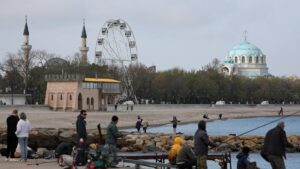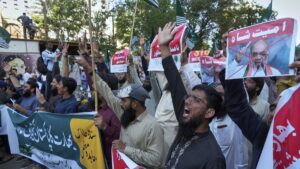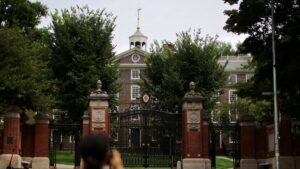Mohammad Azmouz, a Syrian barber living in Berlin, called casting his first-ever vote on Sunday at 57 an indescribable experience.
However, the surge in support for Germany’s far-rightist anti-immigration Alternative for Germany (AfD) party has left him worried about his future.
“Why this hatred? We work hard and have built our lives here. We’re not a burden on society. Why the hatred? We love the German people,” Azmouz said.
Germany’s asylum policy was a key issue in this year’s election, with the conservatives and the AfD securing first and second place, respectively.
Concerned by the growing hostility and the rising cost of living, Azmouz cast his vote for the far-left Die Linke party, which campaigned on social justice and vowed more support for low-income households.
“We now miss the days when Mrs. Merkel was in charge of the government,” he said, referring to longtime Chancellor Angela Merkel. “Now everything is expensive … It feels like one is running and running without ever catching up.”
Amid an economic downturn, Germans with an immigrant background are more worried about their finances than the rest of the population. A recent DeZIM study found that 63.4% of migrants share this concern, compared with 46.7% of non-migrants.
Germany’s settled migrant population has never been higher. More than 7 million Germans with an immigrant background were eligible to vote in this election, including hundreds of thousands of former refugees.
Others shared similar concerns about the state of the economy, but not all were looking to the left.
For Mohammed, a Jordanian barber who is not a voting citizen, the rise of the AfD is an opportunity to shake things up in the country. He also believes Germany has the right to protect its borders and population.
Acknowledging mistakes made by the migrant community, he said he supported a tougher stance on violent offenders and backed restrictions on family reunification for refugees.
“If there were an AfD party in my country, I would vote for it,” he said.
Historically, Germany’s Social Democrats (SPD) were the most popular among migrants, with their advocacy for workers’ rights, social welfare and integration. But the party was the biggest loser in this vote.
Alaa Eddin Mhanna, a Syrian plant operator living in Ludwigsfelde near Berlin, voted for the SPD in 2021 but was deterred this year by its pro-Ukraine policy, which he says has also hurt the economy.
“No party truly represents me,” Mhanna said.
The faltering economy was his biggest concern in this vote, he said, adding that it was also the reason for the AfD’s rise.
“I am anxious. Of course, the conservatives won’t build a coalition with them, but they will have a big name as opposition, and I am worried about this,” he added.
Azmouz said he hoped Germany’s next leader, Friedrich Merz, would lead the country toward prosperity.
“We hope that the party that has taken over will have mercy on the people – not just refugees, but all German citizens,” he said.




















































Be First to Comment